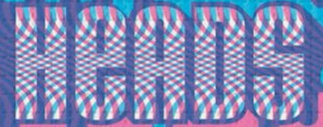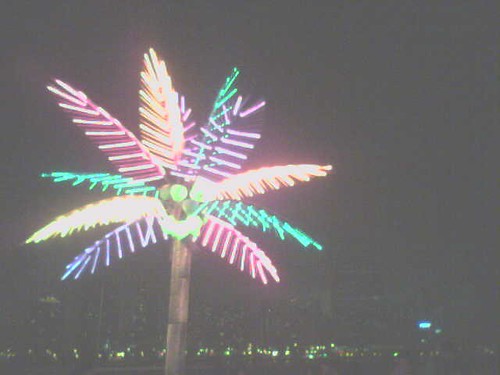o Peter Tork kvetches about how the Monkees have been kept from the Rock & Roll Hall of Fame. I must respectfully disgaree with the otherwise heady folks at Hidden Track. In fact, not only would I argue that the Monkees deserve to be in the Rock & Roll Hall of Fame for their roles as pioneering cultural archetypes, but that a canned institution like the Rock & Roll Hall of Fame was veritably invented for canned bands like the Monkees. I also think it’s a bit of a double-standard for them to honor those doing the canning (like, say, Phil Spector) but denying the messengers’ existence.
o Some great Mets-related profiles over the past few months: Jose Valentin (and how he is a player/owner in Puerto Rico), El Duque (and an older story about his arrival in the United States on a raft), Jose Reyes (and how he’s da bomb), Rick Peterson (and how he’s batshit, into crystals, and could conceivably turn an Oblique Strategies deck loose on the bullpen), and — on the cover of Sports Illustrated this week — Omar Minaya (and the Mets’ new new pan-racial funk; step over Sly Stone).
o An academic paper titled “Human Computer Interaction in Science Fiction Movies.” Haven’t gotten around to reading it yet, but it looks promising.
o Wunderkammern pal and Sea of Sound host Michael Slaboch contributes (along with Tony Mendoza) to the Third Coast International Audio Festival. Their “New Pleasant Revolution” is the fourth audio documentary down.
o A preview of the forthcoming (and officially sanctioned) Robot Chicken Star Wars special, out this weekend.
Watching the Mets melt over the weekend, there were numerous tasteless jokes I wanted to make about unsuspended steroid-free reliever Guillermo Mota. But there was nobody around. I thought about logging on to one of the entertaining comment threads on MetsBlog.com. Entry into the Mets’ online fan community is something I’ve been hesitant about, though.
When fans of bands or authors or comic books or even politicians gather online, it is usually for the purpose of creating a virtual community, a collectively imagined place to give body to an idea. But baseball fans already have a physical home: the ballpark. That’s not to take anything away from Mets fans that post online, just to note that the meaning and tenor of their conversations is different. They are an old-fashioned mini-diaspora that doesn’t need the net to survive, just AM radio and somebody in a similarly colored hat. I was happy to save my rude comments until those conditions were met. Didn’t take long.
“I Wish It Would Rain” – The Cougars (download) (buy)
from Jamaica to Toronto, 1966-1974 compilation
released by Light in the Attic
(file expires June 20th)
Apparently, this is a Temptations cover, though I only know the Cougars’ version from the Jamaica to Toronto, 1966-1974 soul/reggae compilation. The vibe amazes me every time, which simultaneously nails the heartache of the lyrics (“raindrops will hide my teardrops, and no one will ever know”) and the feeling of swampy, unbearable humidity. Part of that is in the particular crackle of the recording, but a good deal of it is the arrangement: the alternating notes between the guitar and the heartbeat kickdrum, the atmospheric organ. Of course, it has a hook, which reminds me of Hendrix’s “Burning of the Midnight Lamp” (a song I haven’t heard in probably 13 years, when I learned a mongrelized version for a summer camp band, so maybe I’m totally misguided). But it is the conflation of weather and emotion that does it. Not that it’s gotten too humid yet this summer, but I’ve been feeling “I Wish It Would Rain” lately, wanting to watch sheets of flamboyant storms come crashing across the basketball court outside.
“Summer Salt” demo – Funny Cry Happy (download)
Wrote this song in October but had occasion(s) to record it this evening. I think there are some partying Puerto Ricans in the background on one of the tracks. It’s a very rough mix right now, though C.P. Farnsworth will soon tweak it up proper. It’s short & could probably use a bridge. Also uploaded to the Funny Cry Happy MySpace page…
Examples of my handwriting, 15 years apart. The right two columns are from 2007, the lefthand columns are from 1992. The 3s and 8s are loopier, and I was more inclined to write in cursive, but not many differences besides those. That said, the 2007 version doesn’t really look (to me) like my normal handwriting anyway. Ah, the durress of Yahtzee.
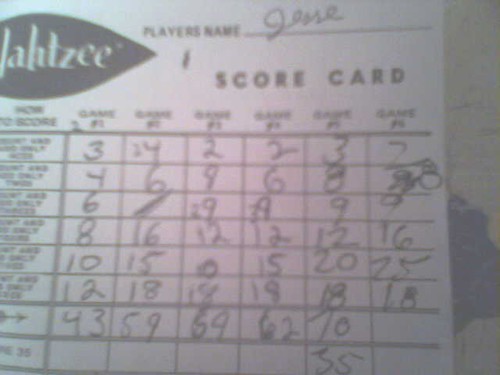
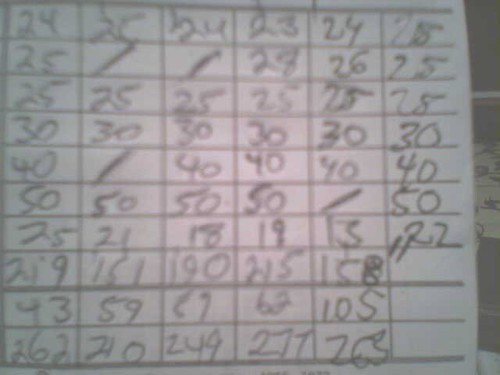
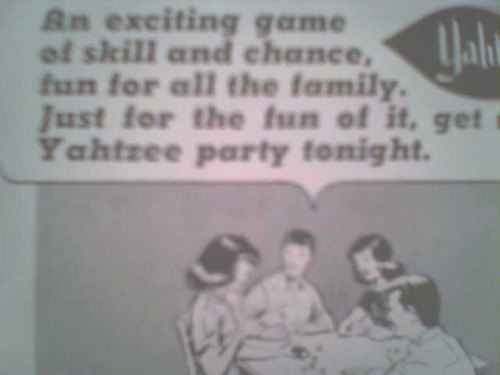
Episode 21: Surf’s Up…
…mmmhmmhmm…
Listen here.
1. “Let’s Go Crazy” – Prince & the Revolution (from Live in Syracuse)
2. “Frow Show Theme” – MVB
3. “Erotic City” – Dump (from That Skinny Motherfucker With the High Voice?)
4. “Hallelujah the Hills” – Hallelujah the Hills (from Collective Psychosis Begone)
5. “I Think That Echo Finally Fadeed Away” – A Big Yes & A Small No (via myspace.com/abigyesandasmallno)
6. “Return of the Tourist” – Jason Holstrom (from The Thieves of Kailua)
7. “2300 Hawaii” – Yoshinori Sunahara (from Sushi 4004 compilation)
8. “Sad & Lonesome” – RANA (from Here in the USA)
9. “A Life of Possibilities” – Dismemberment Plan (from Emergency & I)
10. “The Thanks I Get” – Wilco (from Sky Blue Sky b-sides)
11. “These Are the Eyes” – Bodies of Water (from Ears Will Pop & Eyes Will Blink)
12. “Should A Cloud Replace A Compass?” – The Circulatory System (from The Circulatory System)
13. “The Dress Looks Nice On You” – Sufjan Stevens (from Seven Swans)
14. “Lazybones” – Soul Coughing (from Irresistable Bliss)
15. “I’ll Fly Away” – Johnny Cash (from My Mother’s Hymn Book)
Yo La Tengo at Winter Garden, World Financial Center
2 June 2007
Bang on a Can Marathon
Ira: keyboards/piano, James: electronics/drums, Georgia: keyboard/crutches (?!), with: Pat Gubler (PG Six, harp), Matt Heyner (No Neck Blues Band, upright bass), Elson Nascimento (Sun Ra Arkestra, percussion), and Britt Walford (Slint, drums)
Set was 20-30 minute improvisation, possibly including bits from one of The Sounds of the Sounds of Science songs (“The Sea Horse,” maybe?). Mostly free and abstract, save for a pulse in the middle when James switched to drums, at which point it became rhythmic and abstract. But also pretty free.
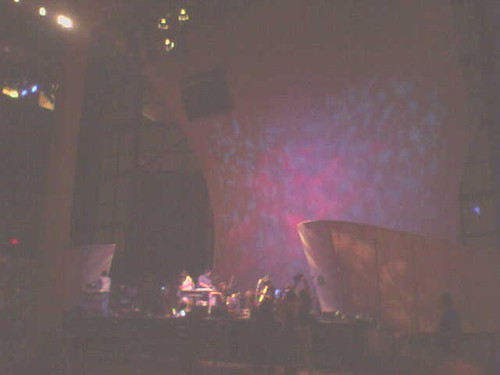
What a specific, weird window of time: when the internet and pinball machines co-existed, and fantasies of one could be channeled into the other. Specifically, 1996, with the release of Johnny Mnemonic movie.

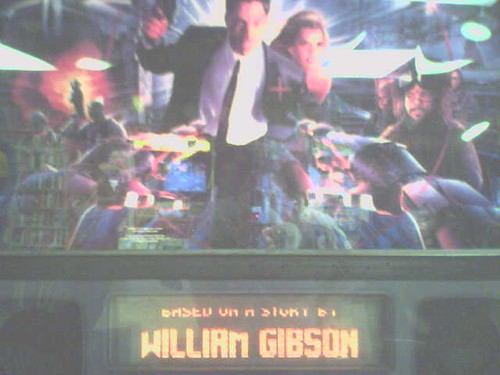
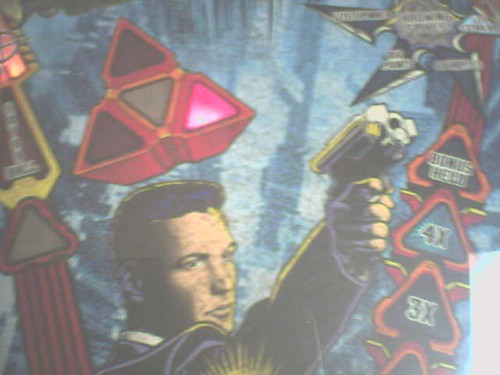
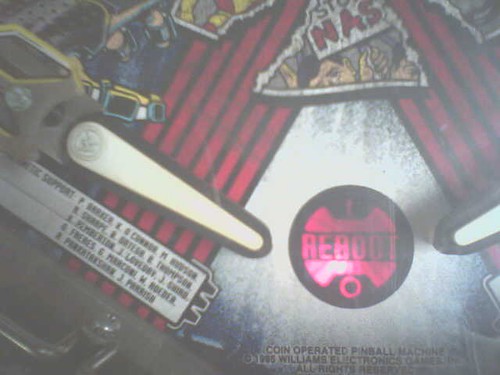
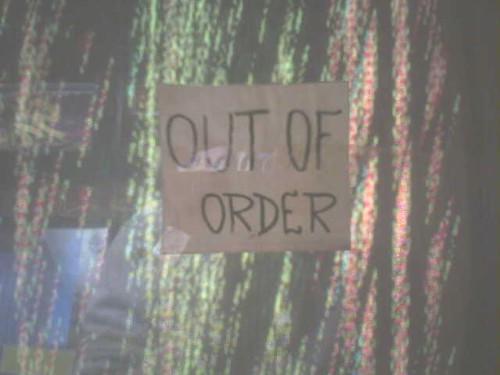
(Also, Centipede finally broke.)

o The Wave dissipates around the seats, following a zagging single-file line before dying completely, more like a secret whispered from one fan to another than any kind of groupmind declaration.
o The ball is a pinprick in a massive field of controlled visual noise. It is like the key to a magic eye. Locating it against the crowd can sometimes be like looking at an Escher, the foreground and the background toppling over one another as one tries to pick up if it is fair or foul, high or low, or even which side of the diamond it’s heading towards. For a dizzying fraction of a second (at least far away) it is all of these places simultaneously. Then it is in the first baseman’s glove, and Damion Easley is heading back to the dugout.
o In extra innings, the PA runs into the deep cuts: The Doors’ “Break on Through,” with Ray Manzarek’s long organ solo to keep fans entertained in lieu of DiamondVision gimcracks. Also because, like, the Mets need to break on through & such. Later, the DJ (what would his title be?) whips out “We Will Rock You” — not just the introductory beat to get the crowd stomping, but the actual song, Freddie Mercury verse and all. As a dramatic cue, it really works.
o The booing of Barry Bonds is an amazing, overwhelming sound. Especially on Tuesday, when he doesn’t come in until a late inning pitch hit appearance, and the crowd finally releases their hatred (is that what it is?), it sounds like a jet going over Shea. Wednesday, a plane passed overhead while Bonds was up, and the sounds were indistinguishable.
o The debate over “performance enhancing drugs” rings a bit false, though, if only because science — especially as it relates to baseball — is almost always destined to prove itself mere folk knowledge. From (the recently late) David Halberstam’s Summer of ’49:
The strain of the heat on the pitchers was even more obvious. They kept a jug of orange juice mixed with honey to drink as a pick-me-up and also a bucket filled with ice and ammonia. Gus Mauch would dip a towel in the bucket and drape it over the pitcher’s neck between innings. “Florida water,” they called it. It was believed that water, any amount of it, would bloat you up, make you heavy, and slow you down. So none of the pitchers took even the smallest drink of water during the game. Allie Reynolds, as a special reward to himself if he made it to the seventh inning in the hot weather, would go over to the cooler, take a mouthful, wash it around in his mouth for a moment or two, then spit it out.
Sometimes, the players ate candybars (no water to wash it down) midgame. Other times, they just stuffed ice into their jocks to fight off fatigue.
